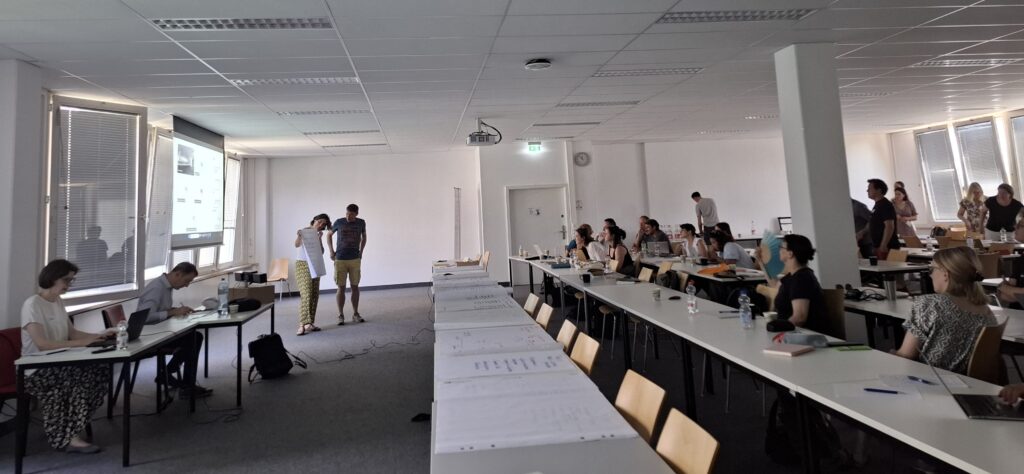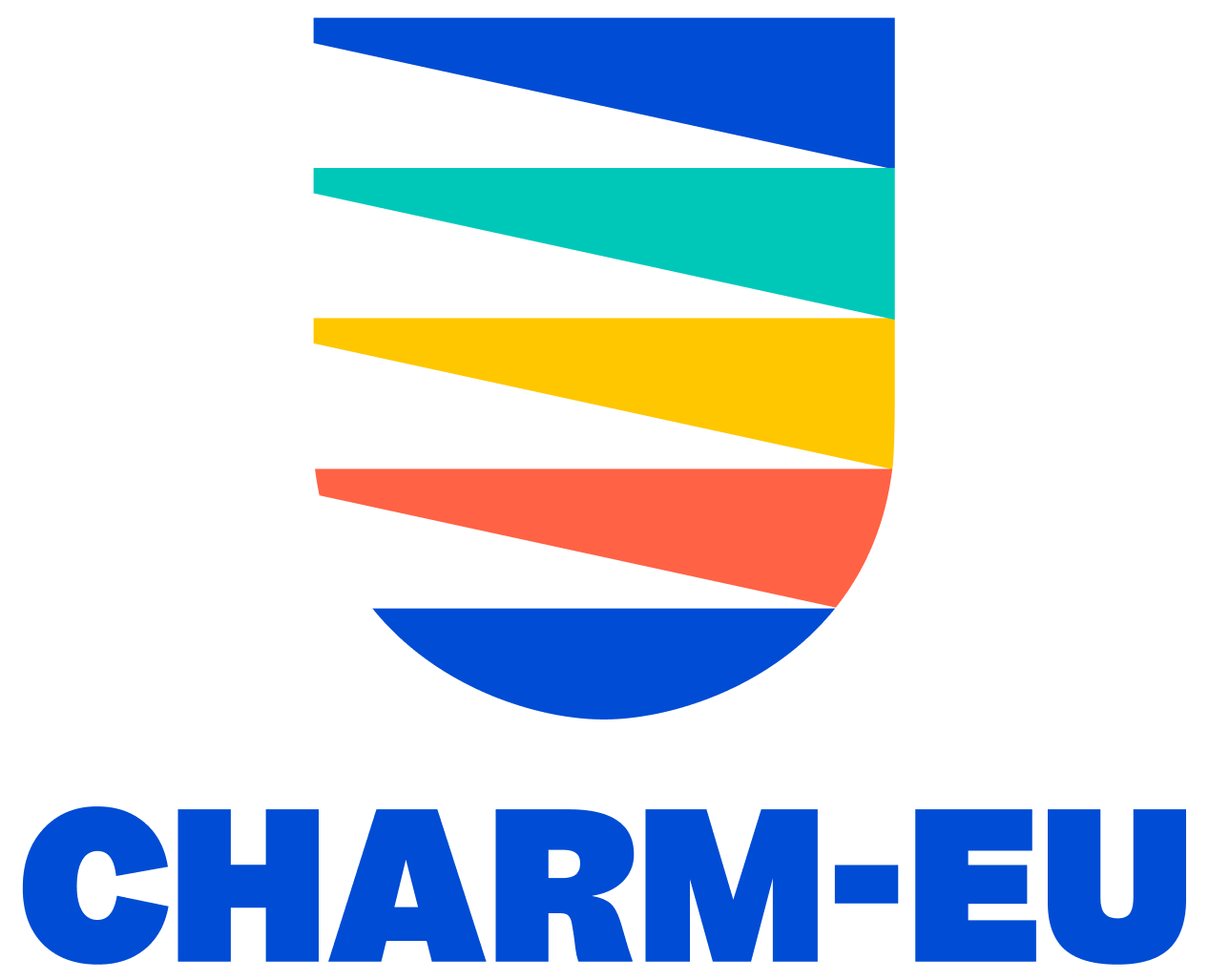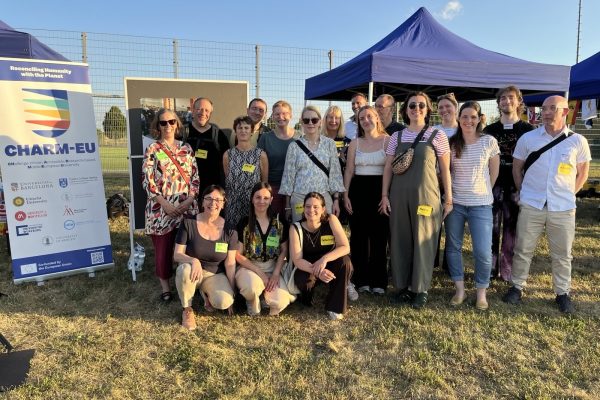Organized by the work package on Professional Inter-Institutional Development and Educational Research led by Dr. habil. Nataliia Lazebna (JMU) and co-led by Annet van der Riet (Utrecht University), the event offered a hybrid format, enabling both in-person and remote participation. The local programme coordinator Prof. Dr. Nadja Simons and CHARM-EU Project Manager Martin Kufferath-Sieberin (both JMU) welcomed the participants of hackathon and emphasized the alliance’s mission to transform higher education through transdisciplinary collaboration and pedagogical experimentation. This dynamic gathering served as a platform for sharing hybrid teaching strategies, exploring emerging technologies, and co-creating educational solutions rooted in sustainability, inclusivity, and challenge-based learning.
Sharing What Works
A central highlight of the hackathon was the exchange during the workshop on best practices in hybrid teaching. Organized by the educationalists Katrin Niewalda (University of Würzburg), Alex Arenas Canon (University of Montpellier), and Nikolas de Keyser (Hochschule Ruhr West), the workshop gave teachers and educators from across the alliance a perfect opportunity to present their most effective methods, followed by lively discussions that encouraged reflection and peer learning. Among the standout contributions:
- Interactive Learning Environments: Ádám Tóth (Utrecht University) demonstrated how tools like Wooclap can enhance engagement and inclusivity in hybrid classrooms.
- Empowering Students Through Emotions: Valérie Borrell Estupina (University of Montpellier) explored how emotional awareness can shape group dynamics and learning outcomes.
- Capstone Project Supervision: Andrea Velich (ELTE) shared her experience mentoring interdisciplinary student teams tackling real-world challenges.
- Flexible Catch-Up Sessions: Anissa Triyanti (Utrecht University) highlighted the importance of adaptable support structures for long-term student projects.
- Teaching Shadowing: Alex Arenas Canon (University of Montpellier) reflected on the value of observing hybrid teaching in action to refine pedagogical strategies.
- Thinking Routines for Reflection: Nataliia Lazebna (University of Würzburg) introduced the 3-2-1 Bridge method to help students track and reflect on their learning journeys.

Co-Creation in Action
Beyond presentations, the hackathon featured a series of interactive sessions and collaborative workshops that embodied CHARM-EU’s core values:
- Knowledge-Creation Team (KCT) Meetings facilitated by Annet van der Riet (Utrecht University) enabled participants to collaboratively develop educational innovations.
- Challenge-Based Learning Workshop by Ádám Tóth (Utrecht University) highlighted interdisciplinary, solution-oriented approaches to real-world problems.
- Hybrid Teaching Practices were shared with a focus on interaction, inclusion, and didactic design.
- Virtual Programme Insights were given by Prof. Dr. Markus Riederer (University of Würzburg) during his presentation of the upcoming Interdisciplinary Sustainability Sciences Digital Course.
- Emerging Technologies were discussed by Prof. Dr. Goran Glavaš and his Team member Antoni Mackowiak (University of Würzburg) in the context of sustainability and digital transformation in higher education. Vanessa Vigano (University of Montpellier) contributed to the Session with her insights on the role of the AI in CHARM-EU Master’s programme.
Continuing the Momentum
What made the hackathon truly special was its spirit of openness and exchange. Participants didn’t just share what worked, they also vividly discussed the challenges they faced, from technical hurdles to student engagement and the balance of synchronous and asynchronous learning.
After this week full of discussions and impressions, attendees left not only with new tools and ideas, but also with inspiration for their teaching practice. The event empowered the community to drive educational innovation and reminded everyone that the future of learning is something we build together through dialogue, experimentation, and shared experience.
In addition to the engaging academic sessions, participants of the CHARM-EU Hackathon in Würzburg enjoyed a variety of social and cultural activities. A guided city tour offered a glimpse into Würzburg’s rich history and baroque architecture, while outdoor gatherings provided a relaxed setting for informal networking and exchange. The participants enjoyed the International Evening, a vibrant celebration of cultural diversity featuring music, dance, and cuisine from around the world, hosted by the University of Würzburg’s International Office.
With CHARM-EU driving the educational transformation, the insights and innovations sparked in Würzburg will contribute to shaping teaching practices and fostering deeper academic collaboration across universities throughout Europe.

